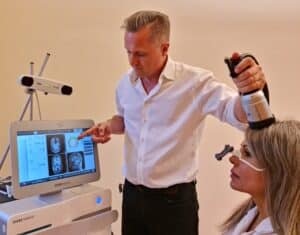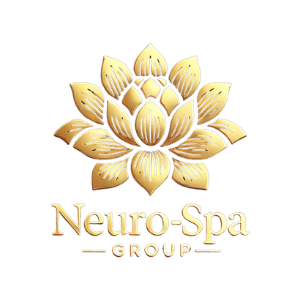CE approved in Dementia of Alzheimer type
After having treated more than 300 patients with Alzheimer`s, vascular and frontotemporal dementia, we have a vast experience and seen positive effects with TMS.
Now we offer a new technique, which is also already CE approved against dementia of Alzheimer`s type: transcranial pulse stimulation (TPS).

Empty (invisible dummy)
The 63 year old patient is in the final stage of Alzheimer´s dementia. On November 3, 2001 after increasing obfuscation she fell into a coma with gasping of breath and bradycardia (Glasgow-coma-scale score: 03). After emergency medical intravenous Ringer solution care with Atropin, Akrinor as well as Xylocain, the patient awoke from the coma, remained however without any type of verbal reaction. Thereafter no medication was administered except for 1000ml Ringer solution. Since the summer of 2001, the patient proved to be therapeutically refractory with regards to the medication with Donepecil and Memantine.
After four weeks without any verbal reaction but with ever increasing psychomotilic agitation the patient in December received several treatments with rTMS.
As a result after three stimulations a reduction in the psychomotilic agitation could be observed. After another three stimulations the patient began to speak again. Although in the beginning there were predominant neologisms, confabulations, and semantic blunders, the patient was able to express after time even concrete wishes and perceptions such as: “Please come”, and “That hurts”. The verbal competence remained at this level into February 2002.
Additionally, after years of inability, the patient was able to lift a glass to her lips and drink independently. The appetite normalized after the magnet stimulation.
During care of an 85 year old patient with mid grade dementia with rTMS there was a great degree of improvement of the symptoms. The positive development was displayed in a renewed vitality as well as an increased interest in the surroundings and an increase in the ability to communicate.
Process:
The patient was initially in a rehab clinic, was however not able to be properly treated there due to refusal to eat. He also displayed emotional lability with lachrymose, a tendency to flee, homesickness, and aggressiveness towards strangers. The necessary measures of care could not be properly administered. After arriving at home the patient appeared emaciated and dehydrated, was relatively immobile, denied basic care, was extremely aggressive during assistance, was disoriented in time and displayed no interest in verbal communication. The patient was at home for a total of 3 weeks when the first treatment of rTMS began.
After the 3rd treatment there was still no considerable change. The relatives did however notice that the patient seemed more lucid and the eyes were clearer.
After the 4th treatment there was a definite increase in interest for the surroundings, for example in the media, current events, as well as the outside world, seasons, and weather.
After the 5th treatment the patient was mindful of his appearance, combed his hair, examined himself in the mirror, used after shave, cleaned spots from his clothes. The patient continued to read the paper daily and watch television.
After the 6th treatment the patient tried to employ remaining abilities such as the following activities around the house: put away dishes, open and close window shades. The patient felt the desire to leave the house and for example visit a Cafe, and this although he is disabled and it is difficult for him to walk.
The relatives noticed after the 7th treatment that the patient actively participated in family discussions and also discussed politics.The newspaper continued to interest him and the local events. The relatives noticed a return of short term memory in as much as the patient was able to remember discussions and events of the previous two weeks, for example he inquired as to when the bath tub seat would arrive and knew that in the pre-Christmas period the Christkindl Market was approaching. However the orientation was still missing for the time of day and week. All in all the patient felt more well adjusted and now took pleasure in life. He had discarded his indifference with relation to his surroundings and had become very communicative.
In December he had caught such a bad cold that the treatments needed to be interrupted. After about 6 weeks without therapy there was a degradation of the re-gained abilities that for example the forgetfulness returned as well as an increased withdrawal inward, increased limitation of mobility and activities.
- Therapeutic efficacy of repetitive transcranial magnetic stimulation in an animal model of Alzheimer`s disease
- The role of repetitive transcranial magnetic stimulation (rTMS) inthe treatment of cognitive impairmentin Patients with Alzheimer´s disease: a systematic review and meta-analysis
- A systematic review and meta-analysis of rTMS effects on cognitive enhancement in mild cognitive impairment and Alzheimer´s disease
- Repetitive transcranial magnetic stimulation for cognitive impairment in Alzheimer´s disease: a meta-analysis of randomized controlled trials
- Adjunctive treatment with high frequency repetitve transcranial magnetic stimulation for the behavioral and psychological symptoms of patients with Alzheimer´s disease: a randomized, double-blind, sham-controlled study
- The role of repetitive transcranial magnetic stimulation (rTMS) in the treatment of cognitive impairment in patients with Alzheimer´s disease: a systematic review and meta-analysis
- Repetitive transcranial magnetic stimulation for the treatment of cognitive impairment in frontotemporal dementia: an open-label pilot study
- Repetitive transcranial magnetic stimulation for apathy in mild cognitive impairment: a double-blind, randomized, sham-controlled, cross-over pilot study
- Similar clinical improvement and maintenance after rTMS at 5Hz using a simple vs. complex protocol in Alzheimer´s disease
- Transcranial magnetic stimulation of the precuneus enhances memory and neural activity in prodromal Alzheimers´s disease
- Effects of repetitive transcranial magnetic stimulation on improvement of cognition in elderly patients with cognitive impairment: a systematic review an meta-analysis
- The role of hippocampal structural synaptic plasticity in repetitive transcranial magnetic stimulation to improve cognitive function in male SAMP8 mice
- Repetitive transcranial magnetic stimulation improves cognitive function of Alzheimer´s disease patients
- Alzheimer´s disease, cerebrovascular dysfunction and the benefits of exercise: from vessels to neurons
- Repetitve transcranial magnetic stimulation enhances spatial learning and synaptic plasticity via the VEGF and BDNF-NMDAR pathway in a rat model of vascular dementia
- Distinct and non-redundant roles of microglia and myeloid subsets in mouse models of Alzheimer´s disease
- Distinct pattern of gray matter atrophy in mild Alzheimer´s Disease impacts on cognitive outcomes of noninvasive brain stimulation
- Repetitive transcranial magnetic stimulation as an alternative therapy for cognitive impairment in Alzheimer´s Disease: a mata-analysis
- Treatment of Alzheimer´s Disease with repetitive transcranial magnetic stimulation combined with cognitive training: a prospective, randomized, double-blind, placebo-controlled study
- Transcranial magnetic stimulation to address mild cognitive impairment in the elderly: a randomized controlled study
- Short and long-term effects of rTMS treatment on Alzheimers´s Disease at different stages: a pilot study
- Effects of noninvasive brain stimulation on cognitive function in healthy aging and ‘Alzheimers´s disease: a systematic review and meta-analysis
- Long-lasting enhancements of memory and hippocampal-cortical functional connectivity following multiple-day targeted noninvasive stimulation
- Targeted enhancement of cortical-hippocampal brain networks and associate memory
- TMS improves memory via brain surface networks
- Open-label, short-term, repetitive transcranial magnetic stimulation in patients with Alzheimers´s Disease with functional imaging correlates and literature review
- Repetitve transcranial magnetic stimulation combined with cognitive training is a safe and effective modality for the treatment of Alzheimer´s disease: a randomized, double-blind study
- Prefrontalcortex rTMS enhances action naming in progressive non-fluent aphasia
- A case report of daily prefrontal repetitve transcranial magnetic stimulation (rTMS) as an adjunctive treatment for Alzheimer disease
- Transcranial magnetic stimulation studies in Alzheimer´s Disease
- Repetitive transcranial magnetic stimulation enhances BDNF-TrkB signaling in both brain and lymphocytes
- Effects of low versus high frquencies of repetitive transcranial magnetic stimulation on cognitive function and cortical excitability in Alzheimer´s dementia
- Noninvasive brain stimulation in Alzheimers´s disease: Systematic review and perspectives for the future
- Improved language performance in Alzheimer disease following brain stimulation
- The restoration after repetitive transcranial magnetic stimulation treatment on cognitive ability of vascular dementia rats and its impacts on synaptic plasticity in hippocampal CA1 area
- Beneficial effect of repetitive transcranial magnetic stimulation combined with cognitive training for the treatment of Alzheimer´s disease: a proof of concept study
